课外补充The Chinese Education System中国教育体系
用英文介绍中国的教育系统作文
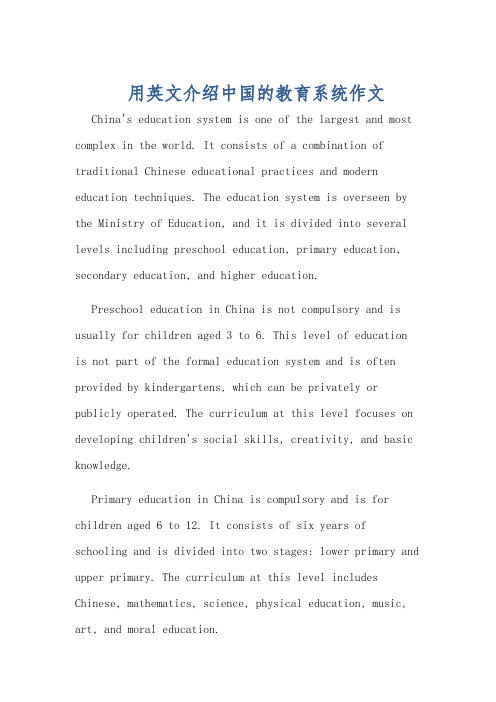
用英文介绍中国的教育系统作文China's education system is one of the largest and most complex in the world. It consists of a combination of traditional Chinese educational practices and modern education techniques. The education system is overseen by the Ministry of Education, and it is divided into several levels including preschool education, primary education, secondary education, and higher education.Preschool education in China is not compulsory and is usually for children aged 3 to 6. This level of education is not part of the formal education system and is often provided by kindergartens, which can be privately or publicly operated. The curriculum at this level focuses on developing children's social skills, creativity, and basic knowledge.Primary education in China is compulsory and is for children aged 6 to 12. It consists of six years of schooling and is divided into two stages: lower primary and upper primary. The curriculum at this level includes Chinese, mathematics, science, physical education, music, art, and moral education.Secondary education in China is divided into junior secondary and senior secondary education. Junior secondary education is for students aged 12 to 15 and consists of three years of schooling. The curriculum at this level is more comprehensive and includes Chinese, mathematics, English, physics, chemistry, biology, geography, history, politics, music, art, and physical education.Senior secondary education is for students aged 15 to 18 and consists of three years of schooling. At this level, students have the option to choose between academic and vocational tracks. The academic track prepares students for the National College Entrance Examination (NCEE), which is the most important examination for Chinese students as it determines their placement into higher education institutions.Higher education in China includes universities, colleges, and vocational schools. China has some of the top universities in the world and is a popular destination for international students. Higher education institutions in China offer a wide range of academic programs and research opportunities.Overall, China's education system has made significant progress in recent years. The government has investedheavily in education, and there have been improvements in access to education, infrastructure, and teaching quality. However, challenges such as regional disparities,curriculum reform, and the pressure of the NCEE continue to impact the system.中国的教育系统是世界上最大、最复杂的教育系统之一。
chinese education system

Academic secondary education is delivered by academic lower and upper middle schools.
Higher Education
Higher education at the undergraduate level includes two-and three-year junior colleges(sometimes also called short-cycle colleges, four-year colleges, and universities offering programs in both academic and vocational subjects. Many colleges and universities also offer graduate programs leading to the master’s or Ph.D. degree.
Education System in China
In China, the education is divided into three categories: basic education, higher education, and adult education. The Compulsory Education Law of stipulates that each child have nine years of formal education.
中国教育方式英语作文
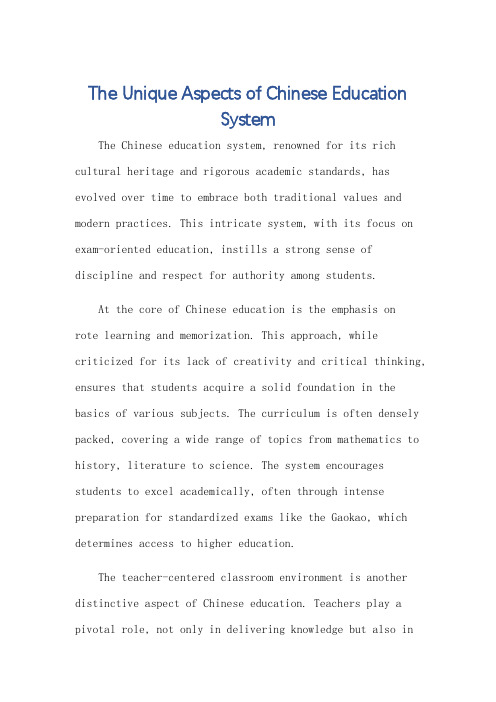
The Unique Aspects of Chinese EducationSystemThe Chinese education system, renowned for its rich cultural heritage and rigorous academic standards, has evolved over time to embrace both traditional values and modern practices. This intricate system, with its focus on exam-oriented education, instills a strong sense of discipline and respect for authority among students.At the core of Chinese education is the emphasis onrote learning and memorization. This approach, while criticized for its lack of creativity and critical thinking, ensures that students acquire a solid foundation in the basics of various subjects. The curriculum is often densely packed, covering a wide range of topics from mathematics to history, literature to science. The system encourages students to excel academically, often through intense preparation for standardized exams like the Gaokao, which determines access to higher education.The teacher-centered classroom environment is another distinctive aspect of Chinese education. Teachers play a pivotal role, not only in delivering knowledge but also inshaping students' moral and ethical values. The authority of teachers is respected, and students are expected to follow instructions and maintain discipline. This hierarchical structure can foster a sense of obedience and respect, but it can also stifle creativity and independent thinking.Despite these traditional elements, the Chinese education system is gradually adapting to modern trends. An increasing emphasis on STEM (Science, Technology, Engineering, and Mathematics) education is evident, as well as a push for innovation and creativity. Many schools now incorporate project-based learning, hands-on experiments, and extracurricular activities to complement thetraditional classroom teaching.Moreover, the rise of international schools and bilingual education programs has broadened the educational horizons for Chinese students. These institutions offer a more internationalized curriculum and teaching methods, preparing students for a globalized world.However, the Chinese education system faces challenges. The intense focus on exams and academic performance canlead to stress and anxiety among students. The lack of emphasis on practical skills and critical thinking canlimit students' adaptability and innovation in the real world.In conclusion, the Chinese education system is a complex blend of traditional and modern practices. While it instills a strong sense of discipline and respect for learning, it also needs to strike a balance between academic excellence and the cultivation of criticalthinking and creativity. As the world becomes increasingly interconnected, it is crucial for the Chinese education system to continue evolving and adapting to meet the challenges of the 21st century.**中国教育体系的独特之处**中国教育体系以其丰富的文化遗产和严谨的学术标准而闻名,随着时间的推移,这一体系已经演变为既包含传统价值观又包含现代实践的综合体。
中国的教育制度(EducationSysteminChina)

中国的教育制度(EducationSysteminChina)中国的教育制度(Education System in China)在现在的社会生活中,制度的使用频率呈上升趋势,制度具有使我们知道,应该做什么,不应该做什么,惩恶扬善、维护公平的作用。
一般制度是怎么制定的呢?下面是小编为大家收集的中国的教育制度(Education System in China),欢迎阅读与收藏。
In China, children begin to go to school at the age of seven. It takes six years for them to finish primary school. In this stage, they are taught elementary knowledge in language and science, which lays the foundation for their further education.After primary school, they go to junior middle school without having to pass any exams. Education at this levol is compvlsory. It lasts for three years, during which the children learn basie Chinese English, Mathematics, Physics and Chemistry.When the junior middle school education comes to an end, the students are screened by exams in two ways. those who expect to go to college may choose to enter senior middle school and those who want to work attend professional schools, The senior middle school education takes 3 years and the professional school 2 to 3 years.The senior middle school graduates have to take competitive exams before they enter college. The college education lasts 4 to 6 years. For a bachelor degree, students take the four year course and pass the defense of thier theses. The master degree students have another two years of study and research work and are given their degree after the defense of their theses.Such is the education system in China.在中国,孩子们7岁开始上学,6年念完小学。
中国的教育系统和教育理念英文文章
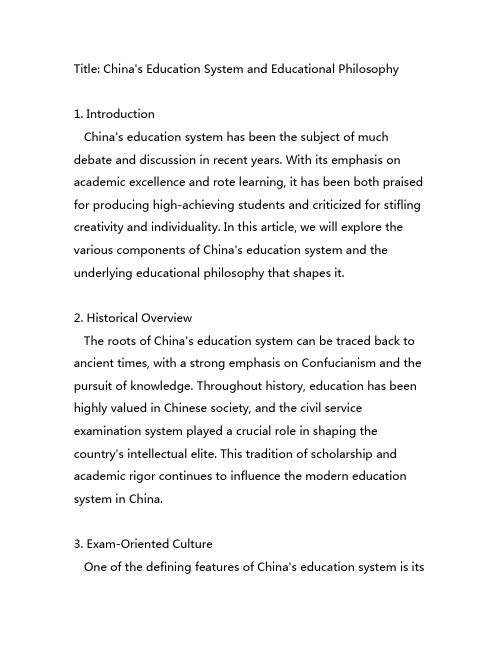
Title: China's Education System and Educational Philosophy1. IntroductionChina's education system has been the subject of much debate and discussion in recent years. With its emphasis on academic excellence and rote learning, it has been both praised for producing high-achieving students and criticized for stifling creativity and individuality. In this article, we will explore the various components of China's education system and the underlying educational philosophy that shapes it.2. Historical OverviewThe roots of China's education system can be traced back to ancient times, with a strong emphasis on Confucianism and the pursuit of knowledge. Throughout history, education has been highly valued in Chinese society, and the civil service examination system played a crucial role in shaping the country's intellectual elite. This tradition of scholarship and academic rigor continues to influence the modern education system in China.3. Exam-Oriented CultureOne of the defining features of China's education system is itsintense focus on exams and academic performance. From a young age, students are encouraged to excel in standardized tests, such as the Gaokao, which determines their future prospects for higher education and employment. This exam-oriented culture can create immense pressure on students and has been criticized for promoting a narrow definition of success.4. Rote Learning vs. Critical ThinkingAnother key aspect of China's education system is its reliance on rote learning and memorization. While this approach has its merits in terms of knowledge retention, it can hinder the development of critical thinking skills and creativity. Some educators argue that a shift towards more interactive and project-based learning methods is necessary to cultivate well-rounded individuals.5. Educational Reform EffortsIn recent years, the Chinese government has implemented various reforms aimed at modernizing the education system and promoting holistic development. Initiatives such as the "Double Reduction" policy and the expansion of vocational education seek to alleviate academic pressure and provide alternative pathways for students. These efforts reflect agrowing awareness of the need for a more balanced and inclusive approach to education.6. Confucian Values and Moral EducationCentral to China's educational philosophy is the imparting of Confucian values and moral education. The emphasis on filial piety, respect for authority, and social harmony permeates the curriculum and underpins the moral development of students. While these values are deeply ingrained in Chinese culture, there are ongoing debates about their relevance in a rapidly changing society.7. Personal ReflectionAs a writer, I have had the opportunity to observe and reflect on the intricacies of China's education system. While I recognize the strengths of its rigorous academic standards, I also see the need for a more balanced approach that nurtures students' individuality and creativity. I believe that a holistic education should encompass not only academic excellence but also emotional intelligence, practical skills, and ethical values.8. ConclusionIn conclusion, China's education system and educationalphilosophy are complex and multifaceted. While it has propelled the country to great academic achievements, it also faces challenges in adapting to the evolving needs of the 21st century. By critically examining its strengths and weaknesses, we can work towards a more inclusive and innovative educational landscape that empowers students to thrive in a globalized world.In this article, we have delved into the historical, cultural, and pedagogical aspects of China's education system and discussed the need for a more holistic approach to education. It is my hope that this exploration has provided valuable insights and a deeper understanding of this pivotal topic.。
英文中国教育体系——CHINESE EDUCATIONAL SYSTERM
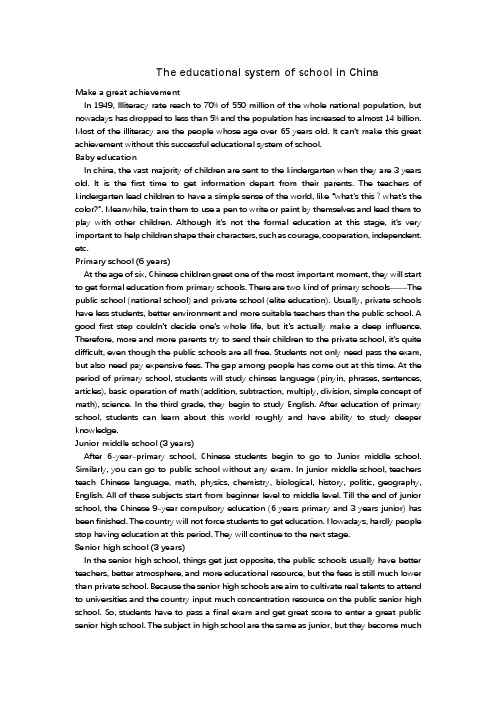
The educational system of school in ChinaMake a great achievementIn 1949,Illiteracy rate reach to 70% of 550 million of the whole national population, but nowadays has dropped to less than 5% and the population has increased to almost 14 billion. Most of the illiteracy are the people whose age over 65 years old. It can’t make this great achievement without this successful educational system of school.Baby educationIn china, the vast majority of children are sent to the kindergarten when they are 3 years old. It is the first time to get information depart from their parents. The teachers of kindergarten lead children to have a simple sense of the world, like “what’s this?what’s the color?”.Meanwhile,train them to use a pen to write or paint by themselves and lead them to play with other children. Although it’s not the formal education at this stage, it’s very important to help children shape their characters, such as courage, cooperation, independent. etc.Primary school (6years)At the age of six, Chinese children greet one of the most important moment, they will start to get formal education from primary schools. There are two kind of primary schools——The public school (national school) and private school (elite education). Usually, private schools have less students, better environment and more suitable teachers than the public school.A good first step couldn’t decide one’s whole life, but it’s actually make a deep influence. Therefore,more and more parents try to send their children to the private school, it’s quite difficult, even though the public schools are all free. Students not onlyneed pass the exam, but also need pay expensive fees. The gap among people has come out at this time. At the period of primary school, students will study chinses language (pinyin, phrases, sentences, articles), basic operation of math (addition, subtraction, multiply, division, simple concept of math), science. In the third grade, they begin to study English. After education of primary school,students can learn about this world roughly and have ability to study deeper knowledge.Junior middle school (3 years)After 6-year-primary school, Chinese students begin to go to Junior middle school. Similarly, you can go to public school without any exam. In junior middle school, teachers teach Chinese language, math, physics, chemistry, biological, history, politic, geography, English. All of these subjects start from beginner level to middle level. Till the end of junior school, the Chinese 9-year compulsory education (6 years primary and 3 years junior) has been finished. The country will not force students to get education. Nowadays, hardly people stop having education at this period. They will continue to the next stage.Senior high school(3 years)In the senior high school, things get just opposite, the public schools usually have better teachers, better atmosphere, and more educational resource, but the fees is still much lower than private school. Because the senior high schools are aim to cultivate real talents to attend to universities and the country input much concentration resource on the public senior high school. So, students have to pass a final exam and get great score to enter a great public senior high school. The subject in high school are the same as junior, but they become much deeper and very difficult, students need to make great efforts to masterthem, they have to get up on 6 o’clock in morning and sleep in deep night and can hardly have spare time. All these efforts are for a final battle after 3 years——the national college entrance examination. It really can change the Chinese students’ fates.The higher education (University-Master-Doctor)Once you go through the single-plank bridge, you will have opportunity to studyfor professional and advanced knowledge in university. It will be a brand new life. Life and learn, never stop.。
英文中国教育体系――CHINESE EDUCATIONAL SYSTERM(优.选)
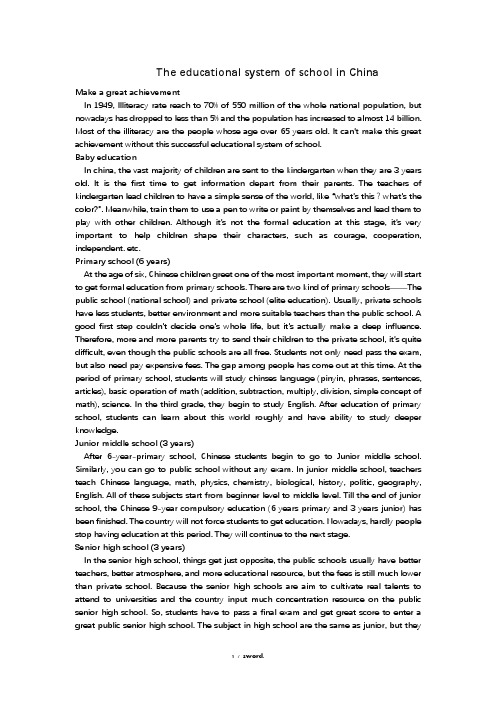
The educational system of school in ChinaMake a great achievementIn 1949, Illiteracy rate reach to 70% of 550 million of the whole national population, but nowadays has dropped to less than 5% and the population has increased to almost 14 billion. Most of the illiteracy are the people whose age over 65 years old. It can’t make this great achievement without this successful educational system of school.Baby educationIn china, the vast majority of children are sent to the kindergarten when they are 3 years old. It is the first time to get information depart from their parents. The teachers of kindergarten lead children to have a simple sense of the world, like “what’s this?what’s the color?”. Meanwhile, train them to use a pen to write or paint by themselves and lead them to play with other children. Although it’s not the formal education at this stage, it’s very important to help children shape their characters, such as courage, cooperation, independent. etc.Primary school (6 years)At the age of six, Chinese children greet one of the most important moment, they will start to get formal education from primary schools. There are two kind of primary schools——The public school (national school) and private school (elite education). Usually, private schools have less students, better environment and more suitable teachers than the public school. A good first step couldn’t decide one’s whole life, but it’s actually make a deep influence. Therefore, more and more parents try to send their c hildren to the private school, it’s quite difficult, even though the public schools are all free. Students not only need pass the exam, but also need pay expensive fees. The gap among people has come out at this time. At the period of primary school, students will study chinses language (pinyin, phrases, sentences, articles), basic operation of math (addition, subtraction, multiply, division, simple concept of math), science. In the third grade, they begin to study English. After education of primary school, students can learn about this world roughly and have ability to study deeper knowledge.Junior middle school (3 years)After 6-year-primary school, Chinese students begin to go to Junior middle school. Similarly, you can go to public school without any exam. In junior middle school, teachers teach Chinese language, math, physics, chemistry, biological, history, politic, geography, English. All of these subjects start from beginner level to middle level. Till the end of junior school, the Chinese 9-year compulsory education (6 years primary and 3 years junior) has been finished. The country will not force students to get education. Nowadays, hardly people stop having education at this period. They will continue to the next stage.Senior high school (3 years)In the senior high school, things get just opposite, the public schools usually have better teachers, better atmosphere, and more educational resource, but the fees is still much lower than private school. Because the senior high schools are aim to cultivate real talents to attend to universities and the country input much concentration resource on the public senior high school. So, students have to pass a final exam and get great score to enter a great public senior high school. The subject in high school are the same as junior, but theybecome much deeper and very difficult, students need to make great efforts to master them, they have to get up on 6 o’clock in morning and sleep in deep night and can hardly have spare time. All these efforts are for a final battle after 3 years——the national college entrance examination. It really can change the Chinese students’ fates.The higher education (University-Master-Doctor)Once you go through the single-plank bridge, you will have opportunity to study for professional and advanced knowledge in university. It will be a brand new life. Life and learn, never stop.最新文件---------------- 仅供参考--------------------已改成word文本--------------------- 方便更改。
中国教育体系英文介绍
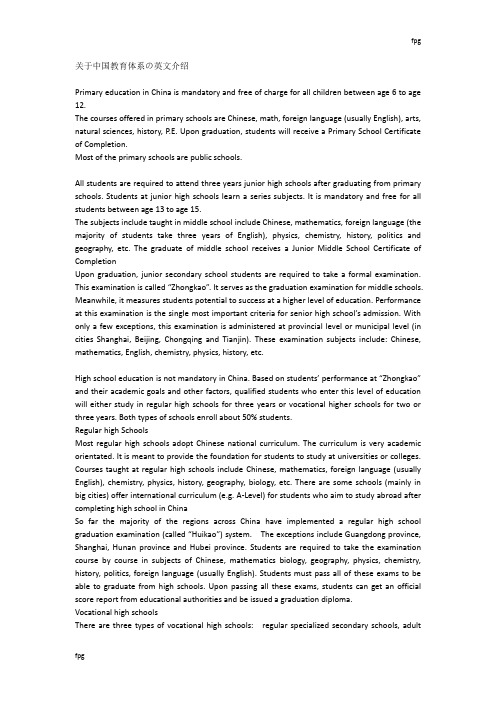
关于中国教育体系の英文介绍Primary education in China is mandatory and free of charge for all children between age 6 to age 12.The courses offered in primary schools are Chinese, math, foreign language (usually English), arts, natural sciences, history, P.E. Upon graduation, students will receive a Primary School Certificate of Completion.Most of the primary schools are public schools.All students are required to attend three years junior high schools after graduating from primary schools. Students at junior high schools learn a series subjects. It is mandatory and free for all students between age 13 to age 15.The subjects include taught in middle school include Chinese, mathematics, foreign language (the majority of students take three years of English), physics, chemistry, history, politics and geography, etc. The graduate of middle school receives a Junior Middle School Certificate of CompletionUpon graduation, junior secondary school students are required to take a formal examination. This examination is called “Zhongkao”. It serves as the graduation examination for middle schools. Meanwhile, it measures students potential to success at a higher level of education. Performance at this examination is the single most important criteria for senior high school’s admission. With only a few exceptions, this examination is administered at provincial level or municipal level (in cities Shanghai, Beijing, Chongqing and Tianjin). These examination subjects include: Chinese, mathematics, English, chemistry, physics, history, etc.High school education is not mandatory in China. Based on students’ performance at “Zhongkao” and their academic goals and other factors, qualified students who enter this level of education will either study in regular high schools for three years or vocational higher schools for two or three years. Both types of schools enroll about 50% students.Regular high SchoolsMost regular high schools adopt Chinese national curriculum. The curriculum is very academic orientated. It is meant to provide the foundation for students to study at universities or colleges. Courses taught at regular high schools include Chinese, mathematics, foreign language (usually English), chemistry, physics, history, geography, biology, etc. There are some schools (mainly in big cities) offer international curriculum (e.g. A-Level) for students who aim to study abroad after completing high school in ChinaSo far the majority of the regions across China have implemented a regular high school graduation examination (called “Huikao”) system. The exceptions include Guangdong province, Shanghai, Hunan province and Hubei province. Students are required to take the examination course by course in subjects of Chinese, mathematics biology, geography, physics, chemistry, history, politics, foreign language (usually English). Students must pass all of these exams to be able to graduate from high schools. Upon passing all these exams, students can get an official score report from educational authorities and be issued a graduation diploma.Vocational high schoolsThere are three types of vocational high schools: regular specialized secondary schools, adultspecialized senior secondary schools,vocational high schools and skilled worker schools. Students in vocational high schools study general courses for high school students. In addition, they receive vocational trainings to prepare them for jobs in a specific field.Upon graduation, some graduates will go directly to work places while others will continue their study at tertiary vocational schools.National College Entrance ExaminationIn order to get into college, students need to take National College Entrance Examination which is known as “Gaokao”. Students’ score at “Gaokao” determines whether they are qualified to go to colleges/universities and which college they can go.Ever since 2003, in most provinces, Gaokao takes place on June 6, 7 , 8(in Shanghai, Shandong, Hainan and Jiangsu, the testing dates are June 6, 7, 8, and 9). Starting from 2000, there has been Spring Gaokao in Beijing, Shanghai, and Tianjin and Shandong province, but it is not as popular as summer Gaokao. Gaokao is administered by the Ministry of Education (MOE). MOE determines the its outline, dates and format, etc.The testing subjects and questions various among different provinces. Math and Chinese are two subjects included in Gaokao nationwide. English, Physics, Chemistry, Geography, Politics, History, Biology are selective subjects which are decided by provinces.。
中式教育的好处和坏处英语作文
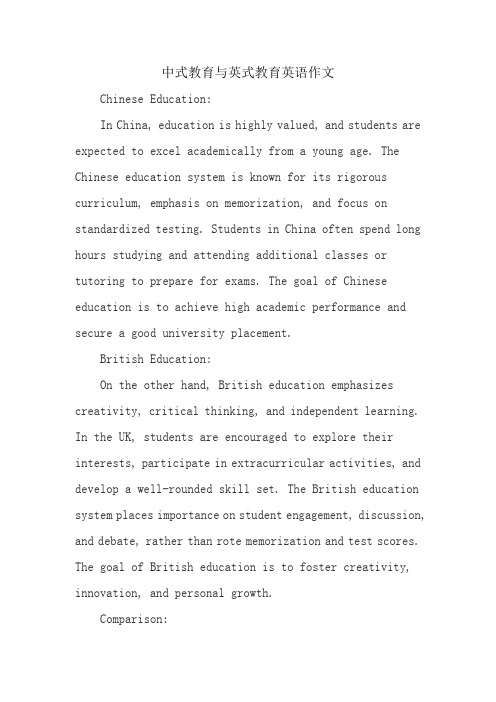
中式教育与英式教育英语作文Chinese Education:In China, education is highly valued, and students are expected to excel academically from a young age. The Chinese education system is known for its rigorous curriculum, emphasis on memorization, and focus on standardized testing. Students in China often spend long hours studying and attending additional classes or tutoring to prepare for exams. The goal of Chinese education is to achieve high academic performance and secure a good university placement.British Education:On the other hand, British education emphasizes creativity, critical thinking, and independent learning. In the UK, students are encouraged to explore their interests, participate in extracurricular activities, and develop a well-rounded skill set. The British education system places importance on student engagement, discussion, and debate, rather than rote memorization and test scores. The goal of British education is to foster creativity, innovation, and personal growth.Comparison:The Chinese education system and the British education system have distinct approaches to learning and student development. While Chinese education focuses on academic achievement and standardized testing, British education values creativity and independent thinking. Chinese students may excel in subjects like math and science due to their strong foundation in these areas, whereas British students may excel in subjects requiring critical thinking and creativity. Both systems have their strengths and weaknesses, and each can learn from the other to improve the overall quality of education.中文翻译:中式教育:在中国,教育备受重视,学生被期望从小就在学术上取得优异成绩。
中国教育China Education System

Higher Education SSE Self Exam Radio, TV University Distance Education
Polytechnic
Senior High School (3Y)
VHS
High School EE
Basic Secondary education degree (industry )Examination
Doctorate
After secondary education specialist, undergraduate and postgraduate education. Implementation of China's higher education institutions to universities, colleges, and Junior College.
高等教育
本科(4-5年)
一般指新中国的高等教育入学考 试,全称为普通高等学校招生全 国统一考试
成人高考 高考 普通高中(3年)
自考
中专
职业高中
中等教育
中考 初中(3年)
指在12—18岁期间在中等学校接受教育的过程。 初中、普通高中、职业高中和中专均属于中等学 校。普通中学分为初中和高中,学制各为3年,初 中毕业生一部分升入高中,一部分升入职业高中 和中专。 中国对适龄儿童,少年实行小学和初级中学一共九 年的义务教育制度. 指6岁起儿童在小学接受6年教育的过程。
Pre-primary education
Means children aged 3-6 in kindergarten education experience
和研究生教育 、学院和高等
Chinese education 中国式教育

Chinese education
Chinese students often start preschool as young as three years old and do not eபைடு நூலகம்ter elementary school until they are six. Chinese believe that this time is crucial to personality development. Students are taught to play games, to dance, to sing, to act and to uphold the values of Truth, Kindness and Beauty.
Chinese education
China currently provides free university education. Students do not have to pay tuition fee and are provided with free on-campus dormitories. Grants or subsidies will be given to students whose families have financial difficulties.
Chinese education
Students have to complete both the primary school program and the junior middle-school program. Higher education is only for those students who have passed examinations of all levels. Student must pass the entrance examination for senior middle schools or middle-level technical schools. Many contests are organized annually in all levels to encourage their study. After two, three or four years, they have to go through national college entrance examination for admission to universities.
介绍中国教育体系的英语作文

介绍中国教育体系的英语作文China's education system consists of three main stages: primary education, secondary education, and tertiary education.Primary education in China lasts for six years and is compulsory for all students. It focuses on building a solid foundation in Chinese, mathematics, and moral education. Students also study subjects such as science, history, geography, and physical education.Secondary education, which includes junior high school and senior high school, lasts for six years. In junior high school, students continue to study a broad range of subjects, while in senior high school, they have more opportunities to choose their subjects based on their interests and career goals. Senior high school students also prepare for theNational College Entrance Examination, which determines their eligibility for higher education.Tertiary education in China includes universities, colleges, and vocational schools. Universities offer academic degrees in various fields, while colleges and vocational schools provide practical training for specific professions. Admission to tertiary institutions is highly competitive, with many students competing for limited spots.Overall, China's education system places a strong emphasis on academic achievement and skill-building. Students are encouraged to work hard, excel in their studies, and strive for success in their chosen fields. While the system has its flaws, such as high pressure and intense competition, it has also produced many talented individuals who have made significant contributions to society and the world.。
The Chinese Education System

The Chinese Education SystemThe Chinese education is based on exam-oriented Education. However, we can’t deny that anything is as good as we can image .Such Educational System leads to many bad effects. Under the exam-oriented pattern, students bear too heavy pressure and their creativities and initiative are wasted. It is clearly that students are under the pressure of many examinations, such as college entrance examination. This is a fact and everyone should admit it. What’s more, examinations may be a good means of testing memory, but they can tell nothing about a person’s true ability and aptitude .On the other hand, they lower the standards of teaching for they deprive the teacher’s freedom. As far as I am concerned, we should be aware of the importance of Quality-oriented Education, which aims at improving students’ skills and being ready for all kinds of challenges in the future .In that case, students may have their own hobbies and abilities so that they can use their intelligence and labor to deal with all kinds of challenges. Therefore, we can try to push Quality-oriented Education as a solution.。
中国的教育英语作文

中国的教育英语作文中国的教育(Education in China)。
Education is an essential part of a country's development and progress. In China, education has always been given great importance and is considered as a key factor in the country's success. The Chinese education system has undergone significant changes over the years and has made remarkable progress in terms of quality and accessibility.The education system in China is divided into three main stages: primary education, secondary education, and higher education. Primary education in China is compulsory and is provided for children aged 6 to 12. It lays the foundation for a child's future learning and development. In recent years, the Chinese government has made efforts to improve the quality of primary education by increasing investment in infrastructure, teacher training, and curriculum development.Secondary education in China is divided into junior and senior high school. Junior high school education is also compulsory and is provided for students aged 12 to 15. It focuses on general education and aims to prepare students for senior high school. Senior high school education is not compulsory, but the majority of students continue their studies in senior high school to prepare for the college entrance examination, which is known as the Gaokao. The Gaokao is a highly competitive and challenging examination that determines a student's future academic and career prospects. It is considered as a crucial turning point in a student's life and is often a source of stress and pressure for students and their families.Higher education in China has also seen significant development in recent years. There has been a rapid expansion of universities and colleges, and the number of students enrolled in higher education has increased dramatically. The Chinese government has also made efforts to improve the quality of higher education by promoting research and innovation, and by establishing partnerships with international institutions.One of the distinctive features of the Chinese education system is its emphasis on academic excellence and achievement. Students are encouraged to work hard and excel in their studies, and there is a strong emphasis on rote learning and memorization. However, there has been growing recognition of the need to promote creativity, critical thinking, and practical skills in education, and efforts have been made to reform the curriculum and teaching methods to achieve these goals.Another important aspect of the Chinese education system is the role of parental involvement. Parents play a significant role in their children's education and are highly involved in their academic and extracurricular activities. There is a strong belief in the value of education and the importance of academic success, and parents often make significant sacrifices to support their children's education.In conclusion, the Chinese education system has made significant progress in recent years and has achieved remarkable success in terms of quality and accessibility. However, there are still challenges and areas for improvement, such as promoting creativity and critical thinking, reducing academic pressure, and addressing the disparities in education quality between urban and rural areas. With continued efforts and reforms, the Chinese education system is poised to further contribute to the country's development and success.。
用英文介绍中国的教育系统作文
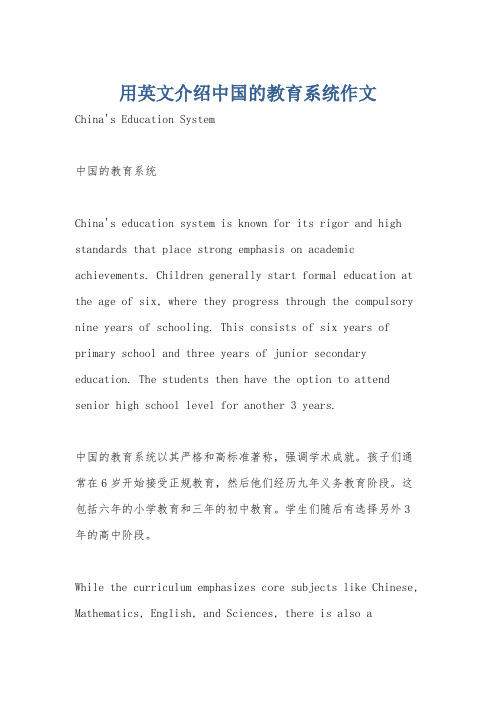
用英文介绍中国的教育系统作文China's Education System中国的教育系统China's education system is known for its rigor and high standards that place strong emphasis on academic achievements. Children generally start formal education at the age of six, where they progress through the compulsory nine years of schooling. This consists of six years of primary school and three years of junior secondary education. The students then have the option to attend senior high school level for another 3 years.中国的教育系统以其严格和高标准著称,强调学术成就。
孩子们通常在6岁开始接受正规教育,然后他们经历九年义务教育阶段。
这包括六年的小学教育和三年的初中教育。
学生们随后有选择另外3年的高中阶段。
While the curriculum emphasizes core subjects like Chinese, Mathematics, English, and Sciences, there is also asignificant focus on cultural education. This includes music, art, physical education, and moral education. There are standardized exams in China akin to those found in many countries around the world. The most crucial ones take place near the end of junior and senior secondary school periods - the "zhongkao" (senior high school entrance exam) and "gaokao" (college entrance exam).虽然课程强调核心科目如语文、数学、英语和科学,但也非常注重文化教育。
中国教育-翻译

1.中国的教育体制分为三个阶段:基础教育、高等教育和成人教育。
The Chinese educational system is divided into threestages: basic education, higher education and adulteducation.2.基础教育包括学前教育(pre-school education)、小学和中学。
Basic education is comprised of pre-school education, primary school and secondaryschool.3.高等教育由职业专科学校、学院和大学组成。
Higher education consists of vocationalschools, colleges and universities.4.1986年,中国开始实行从小学到初中的九年制义务教育(nine-year compulsory education)政策。
In 1986, Chinabegan to implement the policy of nine-year compulsory education from primary school tojunior high school.5.中国政府把教育放在优先发展的战略地位,提出了“科教兴国”的战略方针。
The Chinese government has placed strategic priority on developingeducation, advancing the strategy of developing the nation by relying on the science andeducation.6.在政府和人民的共同努力下,中国的教育取得了历史性的成就。
With the joint efforts of both the government and the people, historic achievementshave been made in Chinese education.1.中国的教育体制分为三个阶段:基础教育、高等教育和成人教育。
英语作文 中国教育

英语作文中国教育英文回答:The Chinese educational system is a highly centralized and competitive one. It is based on the Confucian tradition, which emphasizes rote learning and memorization. Students are expected to work hard and achieve good grades, andthere is a great deal of pressure to succeed.There are many strengths to the Chinese educational system. It is well-funded, and there are a large number of teachers and resources available to students. The system also produces a high number of well-educated graduates who are able to compete in the global economy.However, there are also some weaknesses to the Chinese educational system. It can be very stressful for students, and there is a great deal of pressure to achieve. Thesystem also emphasizes rote learning and memorization,which can lead to a lack of creativity and criticalthinking.Overall, the Chinese educational system is a complex one with both strengths and weaknesses. It is important to understand the strengths and weaknesses of the system in order to make informed decisions about education in China.中文回答:中国的教育制度是一个高度集中和竞争激烈的体系。
英语作文 中国教育

英语作文中国教育Chinese Education。
Education in China has a long history and has been an essential part of Chinese society for thousands of years. The traditional Chinese education system has its unique characteristics and has made significant contributions to the development of Chinese civilization.The Chinese education system is known for its emphasis on academic excellence and discipline. Students areexpected to work hard and achieve high academic standards. This has led to a highly competitive environment in schools, with students striving to excel in their studies. The Chinese education system also places a strong emphasis on moral education, with students being taught the importanceof virtues such as honesty, integrity, and respect for others.In recent years, the Chinese government has madesignificant efforts to reform the education system tobetter prepare students for the challenges of the modern world. One of the key reforms has been the introduction of a new curriculum that focuses on developing students' critical thinking and problem-solving skills. This has been done in response to the increasing demand for highlyskilled workers in the global economy.Another important aspect of the Chinese education system is the strong emphasis on science and technology. China has made significant investments in education and research, and as a result, has become a world leader in fields such as engineering, computer science, and biotechnology. This has helped to drive China's economic growth and has positioned the country as a global leader in innovation and technology.Despite these strengths, the Chinese education system also faces several challenges. One of the biggest challenges is the high level of competition and pressure that students face. This has led to concerns about the mental health and well-being of students, with reports ofhigh levels of stress and anxiety among young people.Another challenge is the urban-rural divide in education. While urban areas have access to high-quality schools and resources, rural areas often lack the samelevel of educational opportunities. This has led to a significant disparity in educational outcomes between urban and rural students.In conclusion, the Chinese education system has a long and rich history and has made significant contributions to the development of Chinese society. While the system has many strengths, it also faces several challenges that need to be addressed. By continuing to reform and improve the education system, China can better prepare its students for the challenges of the modern world and continue to drive innovation and economic growth.。
Chinese Education 中国的教育

Word文档Chinese Education 中国的教育Different countries have different teaching aims and teaching ways. Its well-knownthat Chinese education is exam-oriented education in the past. Obviously,exam-oriented education has some disadvantages, like the disconnection betweentheory and practice that renders students with high scores have low abilities.So, our country decide to change exam-oriented education to quality education.Quality education is focus on the development in an all-around way. Under this kindof education system, students will study easier and get improvement for all sides.参考译文不同的国家有不同的教学目标和教学方法。
众所周知,过去中国的教育是应试教育。
明显,应试教育存在一些弊端,如理论和实际脱节,使学生高分低能。
因此,我国确定把应试教育转向素养教育。
素养教育是以全面进展为重点。
在这样的教育体制下,学生学习将会更轻松,方方面面都会得到提高。
1/ 1。
- 1、下载文档前请自行甄别文档内容的完整性,平台不提供额外的编辑、内容补充、找答案等附加服务。
- 2、"仅部分预览"的文档,不可在线预览部分如存在完整性等问题,可反馈申请退款(可完整预览的文档不适用该条件!)。
- 3、如文档侵犯您的权益,请联系客服反馈,我们会尽快为您处理(人工客服工作时间:9:00-18:30)。
The Chinese Education SystemThe education system in China is still very much rooted in Confucian philosophy. Beginning in elementary school, children endure round after round of extremely stringent exams. Students dream of attaining high enough marks to advance academically and gain acceptance into prestigious schools. Tests are based primarily on rote memorization and students seldom have a chance to express themselves through written or oral presentations. There is very little opportunity for individual creativity. Achieving excellent grades year after year on a never-ending series of multiple-choice exams is the only thing most students worry about throughout their academic life.In China, pressure to do well academically is intense. Given its massive population, competition for well-paying jobs exceeds anything the average Westerner can imagine. Parents in China go to great lengths to ensure the success of their children. Bribing school officials so one's child can gain entry into a prominent academic program is not unusual. Corporal punishment is also generally not frowned upon.In many elementary and junior high schools, the school year begins in September with teachers sending notes home to the parents. These notes are permission slips to hit the children in the upcoming academic session. Very often, not only do parents grant their permission, but they also ask the teachers to provide "extra hitting." Teen suicide as a result of poor academic performance is not uncommon. Remarkably, getting a grade of 90% on an exam is, in many cases, considered a poor performance!With its huge population, Chinese schools tend to be overcrowded and underfunded. Generally, classrooms have 50 to 60 students or more. Students and their families normally have to pay for tuition, books, school uniforms and meals. These meals consist primarily of rice and oily vegetables provided by local restaurants and snack shops.Students typically arrive at school at about 7:00 or 7:30 AM and usually don't leave until 4:00 or 5:00 PM. Following their grueling day at school, students who can afford it spend their evenings and weekends attending private classes, often until 10:00 PM or later. In these private classes, students receive extra training in the hopes of gaining a competitive edge in the examination process. It is not unusual for some students to spend 20 to 25 hours per week attending supplemental after-hours classes. The ultimate goal is to get accepted first into a so-called "good junior high school," then into a "good high school" and finally into a "good university."With so many people and relatively few places available in China's universities, the entire education system is not so much geared to educating students as it is to weeding them out. Children are faced with hundreds of exams while going through primary and secondary school. Thrust into a fiercely competitive environment at an early age, the path to success is fraught with many obstacles and countless chances for failure. Only a select few who are lucky enough and clever enough manage to make it into a so-called "good university." This secures an almost guaranteed path to a decent career and a healthy financial future. The entire academic process, in effect, parallels the ancient Imperial examination system based on Confucian principles of learning.The Chinese education system isnot so much geared towardeducating as toward weeding outstudents. Only the very brightesthave any hope of succeeding.Beginning in the first gradeof elementary school, moststudents make their way toschool between 6:30 and7:00 AM. Studentsattending after-hoursclasses often study well past9:00 or 10:00 PM. Bedtimefor most elementary andjunior high kids is 11:00 PMor later.University LifeUnlike the typical Western education system, once accepted into a university, a Chinese student's life improves dramatically. Chinese people often say that childhood is a time to work hard but university life is a time to play. It is pretty much a reversal of standard Western views on childhood development.In China, university students are secure in the knowledge that "they've made it." Getting expelled from university for any reason is virtually unheard of. Simply having achieved the impossible of actually surviving childhood and gaining entry into a post-secondary school is considered an adequate accom-plishment in and of itself. University students spend a considerable amount of time joining various clubs and activities and essentially making up for their lost childhood.One of the features of university training in China that strikes most Westerners as unusual is the widespread practice of plagiarism. Chinese students are products of a school system that tends to extinguish all forms of creative thought. Once in university, they are expected to write essays, term papers, presentations, etc....and, lacking any experience in these skills, plagiarizing is the only way they can survive. Professors in China regularly hand out A's and B's for essays and papers which are blatantly lifted off the Internet or copied from a book. In Chinese universities, plagiarism is the norm rather than the exception.At the university level inChina, plagiarism is rampant.In summary, the Chinese education system, founded on Confucian principles of learning, is a competitive system based on extensive testing. It stifles creative development and provides opportunities for only a tiny fraction of the total population. When interacting with people in China, keep in mind that almost all of them have suffered enormously under this system. It is best to cultivate a forgiving attitude toward those who sometimes seem unable to deal with situations requiring creative solutions—no matter how simple the prob-lem may appear to you.。
